2020 Update: Fighting for Your Essential Rights
2020 has brought us multiple, historic challenges. Here’s how Free Press has responded.
A MESSAGE FROM OUR CO-CEOs
Free Press has faced this moment with character, care, creativity and good old-fashioned hard work — and made progress that would have been unthinkable just months ago. All year we’ve identified new pathways to get everyone connected to broadband, stop hate and disinformation online and on TV, and reinvent local journalism.
We’re leading the fight to ensure that everyone is connected to trustworthy, lifesaving news and information. And with more than 1.4 million activists working alongside us to demand media that people deserve — media that are just, equitable and tell the truth — we’re showing what’s possible in this unprecedented time.
Our donors make all of our work possible — and we couldn’t be more grateful. Your generosity has enabled us to respond to the crises of 2020. And because we’re funded solely by independent charitable foundations and gifts from individuals, we’ll rely on your continued generosity to fuel our work in the months ahead. Read on to learn what you’ve helped accomplish so far this year.
In solidarity,
Craig Aaron and Jessica J. González
Co-CEOs
Free Press and Free Press Action
HOLDING COMPANIES ACCOUNTABLE FOR HATE AND DISINFORMATION
Stop Hate for Profit: Confronting Discrimination and Disinformation Online
Hate and disinformation threaten our democracy and can have deadly consequences — especially during a pandemic. Free Press was a leader of Stop Hate for Profit, the most successful public-pressure campaign against Facebook to date.
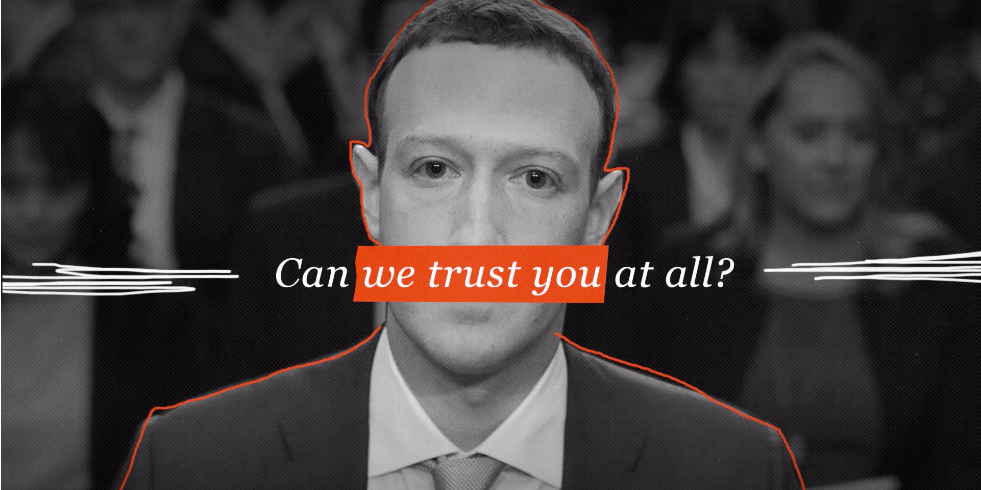
In June — alongside our partners at ADL, Color Of Change, Common Sense Media, the NAACP, LULAC, Mozilla, the National Hispanic Media Coalition and Sleeping Giants — we called on Facebook advertisers to pull their ads until the platform takes concrete steps to crack down on hate and disinformation. We’re urging Facebook to hire leadership committed to civil rights, submit to third-party audits, remove white supremacists, stop exempting politicians and political ads from its policies, and adopt the model policies of the Change the Terms coalition, which we co-founded and co-lead.
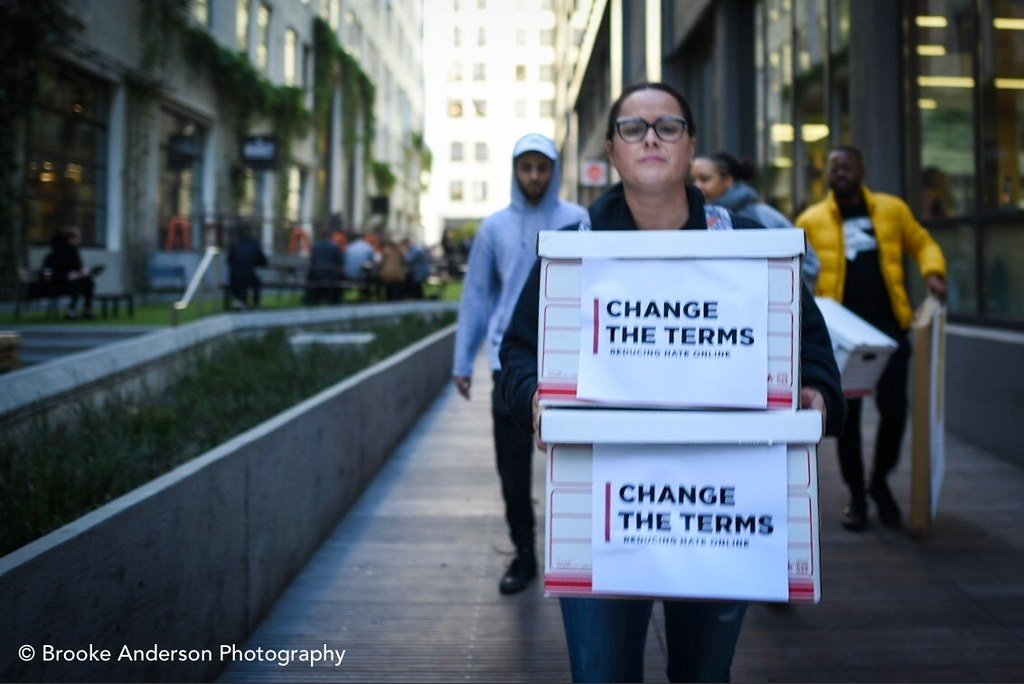
Free Press Co-CEO and Change the Terms co-founder Jessica J. González delivers petitions urging Twitter to crack down on racism.
We’re standing strong as we face down Facebook’s top executives — and getting results.
We convinced more than 1,000 advertisers to pause ads on Facebook, including some of the biggest ad spenders on the platform, like Adidas, Coca-Cola, Ford, Hewlett Packard, Procter & Gamble and Unilever. Facebook’s stock values plummeted $56 billion shortly after the campaign’s launch. The company has become increasingly unpopular — a recent Accountable Tech survey revealed widespread public awareness and support for the boycott. And there is increasing evidence of revolt within Facebook itself, where many staffers have urged the company to take action against posts that incite violence and spread lies.
In July, Free Press Co-CEO Jessica J. González and other coalition leaders met with Facebook CEO Mark Zuckerberg, COO Sheryl Sandberg and other top company executives. After the meeting, we dominated the press narrative with the message that Facebook is failing on civil rights and letting its advertisers down. The company subsequently announced that it will:
- Invest more in enforcement
- Ban hateful ads and pandemic disinformation, as well as harmful stereotypes and racist depictions of women and Jewish, Black, Muslim, Mexican, transgender and non-binary people
- Hire a vice president of civil rights
- Submit to a third-party audit of its content-moderation practices
- Apply its policies to politicians
Other companies are feeling the heat, too.
After Reddit CEO Steve Huffman met with Free Press and our allies in June, the company released new policies against hate and violence and banned 2,000 forums. YouTube deplatformed six high-profile white supremacists. And Amazon-owned Twitch temporarily suspended Donald Trump’s channel for “hateful conduct.”
Through our leadership of the Change the Terms coalition, we’d been campaigning for months against Twitter and protested outside its headquarters. After we pressed our demands with CEO Jack Dorsey, Twitter updated its hate-speech policy to prohibit tweets that link to content that violates the company’s policies — and suspended the account of former Ku Klux Klan Grand Wizard David Duke.
Long time coming. pic.twitter.com/Rq2jEAgKQ7
— Henry Fernandez (@HenryFernandezJ) July 31, 2020
Our momentum is building.
In late July, the CEOs of Apple, Amazon, Facebook and Google testified before the U.S. House Judiciary Committee, where they came under scrutiny for anti-competitive behavior. Members of Congress pointed to our #StopHateForProfit campaign four times during that hearing as proof of Facebook’s failure to crack down on racism and other forms of hate.
In August, Free Press joined Common Cause, Electronic Frontier Foundation, Maplight, Protect Democracy, Rock the Vote and Voto Latino as plaintiffs in a lawsuit challenging the Trump administration’s May 28 executive order that seeks to punish social-media companies for fact checking the president’s online posts.
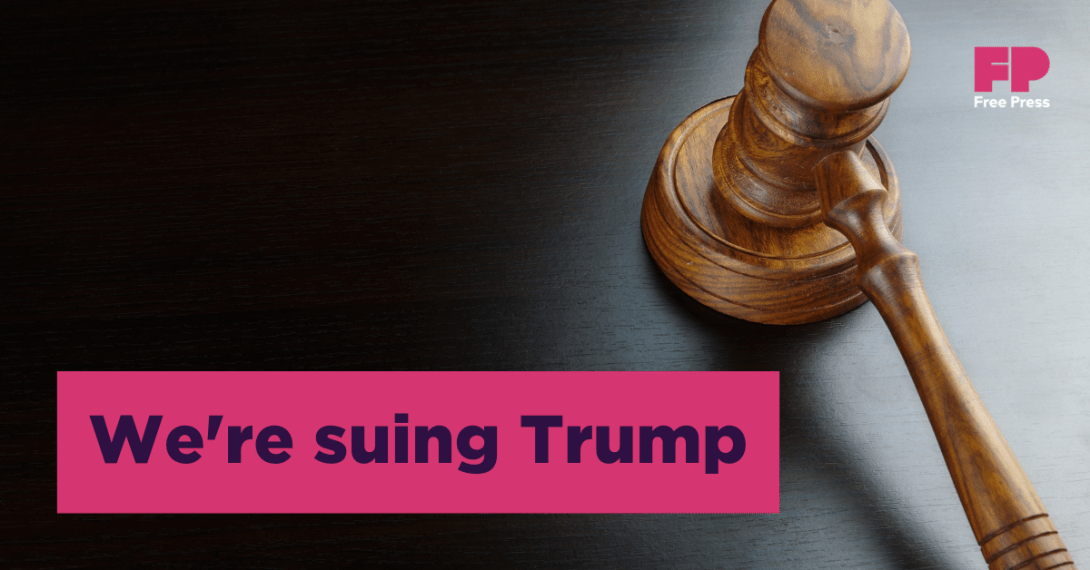
There’s much more to do to hold these companies and bad government actors accountable and stop the spread of hate and disinformation online — but this is real progress.
MEDIA DISINFORMATION: HOLDING BROADCASTERS ACCOUNTABLE
Free Press is taking on broadcasters that are spreading disinformation, racism and misogyny over the public airwaves.
Exhibit A: Fox News. Fox has been spreading dangerous coronavirus conspiracy theories and racist lies. We launched #BoycottFox to pressure advertisers to stop funding hate and disinformation, and we’ve called for the removal of racist anchor Tucker Carlson.
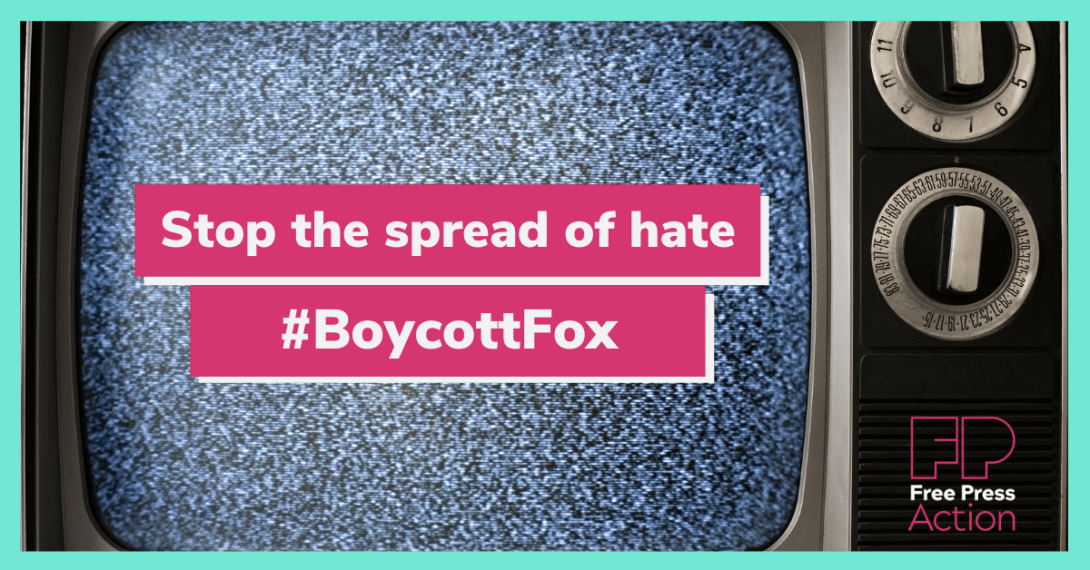
We also mobilized the public to pressure the FCC to hold broadcasters responsible for airing right-wing conspiracy theories and fake medical advice about COVID-19 on Fox and on iHeart Radio shows hosted by Sean Hannity and Rush Limbaugh. And we filed an emergency petition with the FCC, calling on the agency to issue immediate guidance to broadcasters that it’s against FCC policy for broadcasters to spread disinformation.
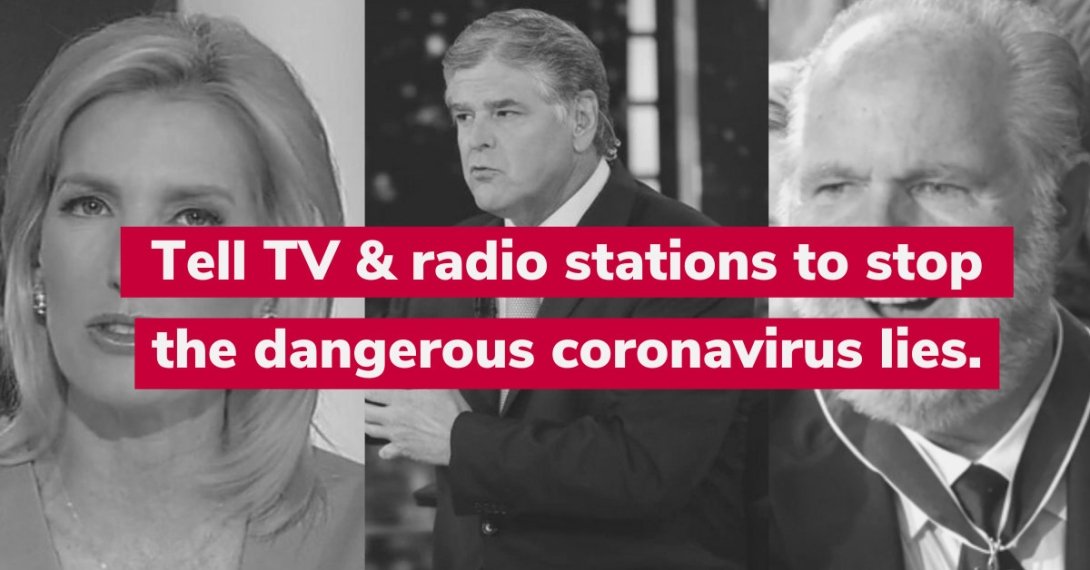
Though the Trump FCC rejected our petition and Hannity attacked us on his show, we will continue to shine a light on COVID-19 disinformation — and on the agency’s ongoing failure to act in the public interest.
ADVOCATING FOR INTERNET FOR ALL DURING THE PANDEMIC
Getting — and Keeping — Everyone Connected to the Internet
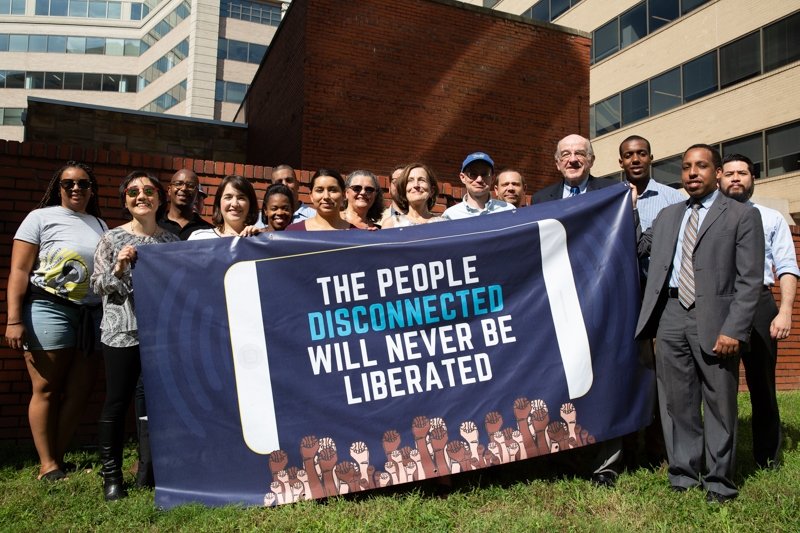
Free Press staffers join with allies and activists to urge the FCC to ensure everyone can connect to affordable internet.
Closing the digital divide has become even more urgent during this crisis, with millions of people relying on the internet to communicate, work, organize, seek medical care and go to school. At the same time, windows for far-reaching, progressive policy change have opened up. Free Press Action is leading debates on broadband access and affordability, influencing major legislation, and shaping public understanding about what’s at stake — and what’s possible.
Free Press Campaign Manager Nilda Muhr talks to Univision about the pandemic.In the early days of the COVID-19 crisis, we issued a comprehensive and detailed set of policies to connect and keep people online during and beyond the crisis. Our plan called on Congress to allocate up to $100 billion in subsidies, rebates and tax relief that would benefit people, not just big companies.
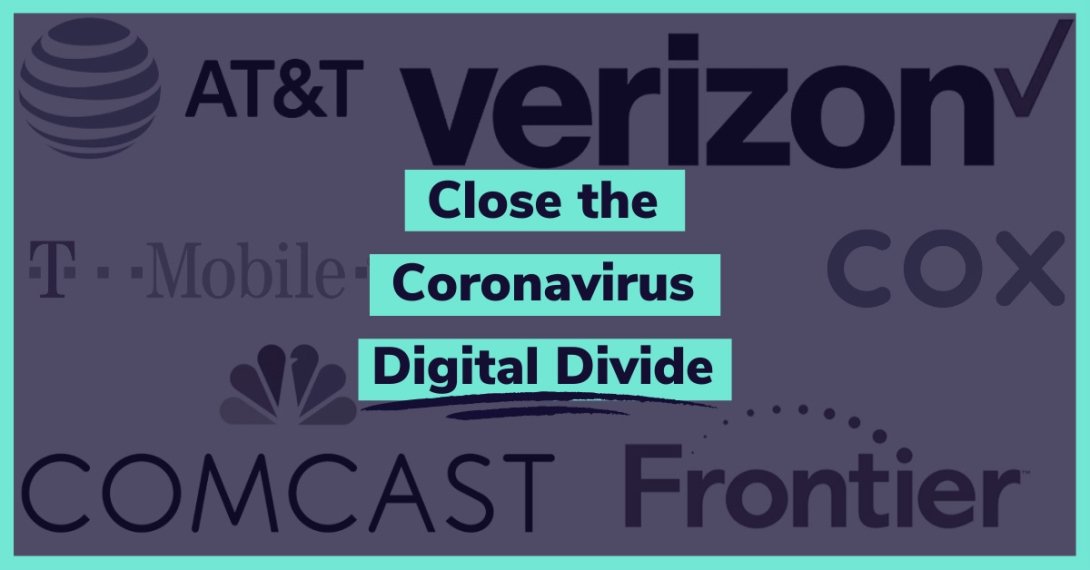
At the same time, we called for a number of immediate steps for internet service providers to take to make broadband access more affordable and available and to stop all utility shutoffs. Under pressure from Free Press and our allies, as well as local and federal officials, the companies made major concessions they had long resisted around fees and various punitive actions — the kinds of measures they swore were impossible before the crisis hit. Sustained public pressure will be necessary to stop companies from backsliding — and to expose those that don’t keep their promises.
Our policy ideas and advocacy had a major influence on landmark broadband legislation in Congress. Throughout the spring, Free Press Action spent hundreds of hours in meetings with policymakers, conducted deep policy analysis and helped shape the broadband-stimulus language in a major bill that passed the House in May. Among other crisis supports, the HEROES Act would provide billions in emergency funds for broadband connectivity, centering the needs of low-income families, people who have lost work and people who are incarcerated.
While the recovery bill stalled in the Senate in a political impasse, we’re working to ensure broadband access is part of any future recovery package.
Fighting for Net Neutrality
Free Press continues to lead the fight for Net Neutrality and is laying the groundwork to restore open-internet protections in 2021. We secured the support of every major Democratic presidential contender, as well as record numbers of lawmakers from both sides of the aisle.
In April 2020, we filed legal comments at the FCC alongside more than 10,000 comments we collected from our activists. These comments support strong Net Neutrality protections as they relate to public safety and affordable internet access — issues the federal appeals court had ordered the agency to revisit.
Curbing Spying and Surveillance
Activists of color have long been the target of unwarranted government spying programs. As protests against state-sanctioned violence against Black people began to sweep the country in the wake of George Floyd’s murder, Free Press worked to curb government-surveillance powers. At the same time, the racial-justice uprisings are elevating calls to defund government surveillance.
We’ve continued our work to #ProtectBlackDissent and oppose the FBI’s classification and harassment of “Black Identity Extremists.” In March, we held a virtual Capitol Hill briefing with Rep. Ilhan Omar. We teamed up with MediaJustice to write a letter signed by more than 100 groups urging Congress to defund police surveillance and stop spying on Black Lives Matter activists. This was the largest coalition ever to weigh in on the issue, with both grassroots groups and established D.C. organizations signing on for the first time.
Free Press Action Government Relations Director Sandra Fulton helped organize a congressional briefing on the FBI’s history of harming racial-justice activists.In spring 2020, we led the opposition to a weak surveillance bill that failed to rein in the abuses of the Patriot Act — and stopped it from passing. For now, the worst elements of the Patriot Act have expired and have not been reinstated by Congress. We’ll work to block any attempts to resurrect unwarranted spying powers after the November elections.
Advocating for Resilient Communications Networks in Puerto Rico
For the past two years, Free Press has urged the FCC to create an independent commission to investigate the communications crisis in Puerto Rico that followed the 2017 hurricanes. Our May 2019 report, Connecting the Dots: The Telecommunications Crisis in Puerto Rico, detailed how the destruction of communications networks following Hurricanes Irma and Maria contributed to the historic death toll there — and condemns the FCC for its failed response.
Free Press Senior Policy Counsel Carmen Scurato discusses why internet access is a right, not a privilege.In February 2020, Free Press Action’s Joseph Torres testified before Congress about policies that would prevent breakdowns during and after future disasters. In March, we organized a Capitol Hill briefing, “The Communications Crisis in Puerto Rico and Beyond,” sponsored by Rep. Yvette Clarke and featuring remarks from two FCC commissioners.
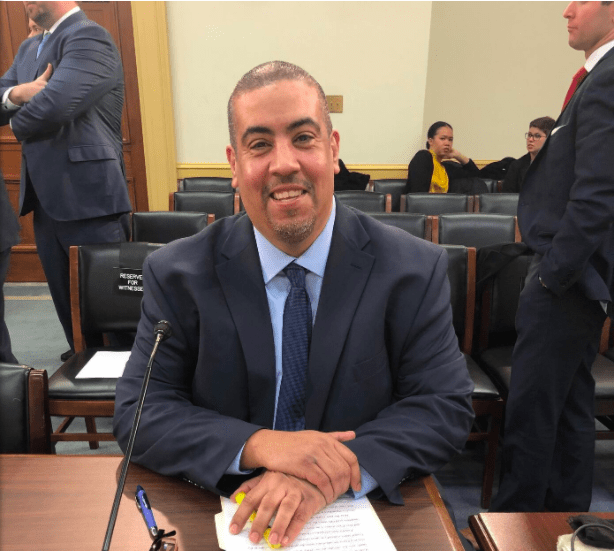
Free Press Action Senior Director of Strategy and Engagement Joseph Torres after his congressional testimony
TRANSFORMING JOURNALISM
Journalism Policy: Advocating for a More Sustainable Future
Free Press Co-CEO Craig Aaron and others discuss the need to support and sustain trustworthy local journalism.Free Press Action led the call for a journalism recovery in the first days of the pandemic with a prominent article by Co-CEO Craig Aaron in the Columbia Journalism Review, which was widely cited in the national press. We’ve since produced a range of work advocating for public funding for journalism. We published a set of policy proposals detailing what a journalism recovery should look like, as well as a report analyzing the reporting gap and the massive loss of U.S. journalism jobs in the 21st century.
Free Press Action has met with numerous congressional offices and state officials and worked to shape and respond to a number of policy and legislative proposals. In April, more than 45 groups and scholars signed a letter based on demands we developed with Common Cause and PEN America. We sent the letter to national decision-makers and all 50 governors to support local journalism as a crucial part of COVID-19 relief efforts.
And in July, we filed a brief in the U.S. Supreme Court to defend media-ownership diversity.
In the latest development in a long-running battle, we urged the court to reject the Trump FCC’s attempt to scrap media-ownership limits. When the Trump FCC gutted longstanding media-ownership protections back in 2017, we sued the agency alongside other public-interest groups to restore those rules. In 2019, a federal appeals court sided with us and delivered a stinging rebuke to the FCC. Nevertheless, the agency took the fight to the U.S. Supreme Court.
News Voices: Organizing for Local News
Free Press’ News Voices project is reimagining local news by putting communities first. We’re connecting people with newsrooms to fight disinformation, lift up diverse voices, end harmful narratives and cover important stories that are missing. This summer, News Voices celebrated its fifth anniversary, continued our award-winning work in New Jersey and North Carolina, and launched new projects in Colorado and Pennsylvania.
??? Celebrating 5 years of #NewsVoices at @freepress & building power w/ communities to transform local news. I’m inspired & humbled everyday by our allies, who I’ve had the great fortune of working alongside.
— Mike Rispoli (@RispoliMike) July 9, 2020
It’s been the best 5 years of my life. ❤️ pic.twitter.com/FlhmzPstPX
To bring reporters and community members together during the pandemic, from March through August we held 25 virtual conversations about local-news needs. We also experimented with tactics such as phone trees and community-information assessments, and tracked newsroom commitments to address residents’ questions, stories and concerns.
Nationwide, we’ve campaigned for newsrooms to address their shortcomings in covering diverse communities and their failures to address their own institutional equity issues. We also issued guides for reporters, such as How to Report on the Digital Divide & COVID-19; Racial Justice: The Key to Truthful COVID-19 Reporting; and, in partnership with Movement for Black Lives, Journalism for Black Lives: A Reporting Guide.
Our work on the state level is expanding and changing the future of news. Here’s the latest:
North Carolina: Creating New Ways to Connect Communities and Fight for Racial Justice
In Charlotte, we’ve hosted eight digital town halls for residents around information needs related to the coronavirus and racial injustice. We facilitated half of these Charlotte Connects forums in English and half in Spanish. To reach people who aren’t online, we innovated a phone-tree model that has since been used in communities around the country. And our local cohort of volunteers created a Charlotte COVID Resource Map.
Free Press Organizing Manager Alicia Bell talks to Charlotte residents about the kinds of news and information they need during the pandemic and beyond.New Jersey: Meeting Community-Information Needs During the Pandemic
We’re launching a new statewide pilot project that will focus on identifying and addressing information gaps and inequities during the COVID-19 public-health crisis and recovery. And Gov. Phil Murphy appointed News Voices Director Mike Rispoli to the board of the New Jersey Civic Information Consortium — a public fund we conceived and designed that will distribute money to support journalism and community-information needs.
Philadelphia: Overhauling Criminal-Legal System Reporting
In partnership with Movement Alliance Project and the Penn/Rutgers Media, Inequality and Change Center, we launched the Police and Violence Narrative Project, which aims to replace prevailing media narratives with complex stories about trauma, safety, crime and criminal justice.
In response to a racist headline that ran in The Philadelphia Inquirer and concerns raised by racial-justice organizers, we organized a letter and set of guidelines with more than 40 community groups calling on the paper to center community voices within its journalism.
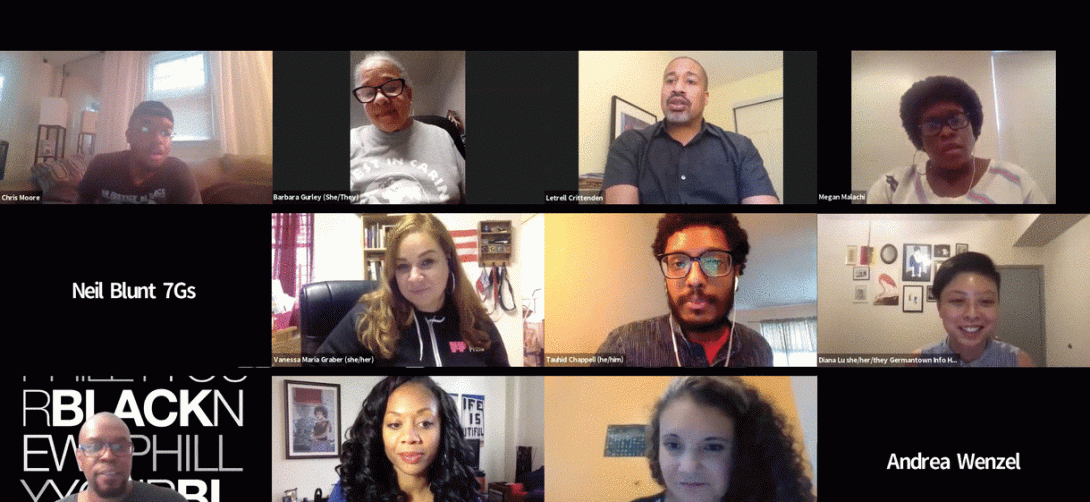
Philly residents discuss local coverage of policing and violence during a virtual News Voices event.
And we organized a sign-on letter with 50-plus local-news organizations and national press-freedom and social-justice groups calling on Philadelphia’s mayor, police commissioner and city council to protect journalists’ rights during the protests and safeguard the public’s right to record.
Colorado: Engaging Communities to Reinvent Local News
In August, we officially launched News Voices: Colorado. Our aim: Create a nurturing space where people across the state can collectively dream of new worlds and realities for local news that hold the importance of access to information and narrative, the acknowledgement of past harm, and the possibility for new and joyous futures.
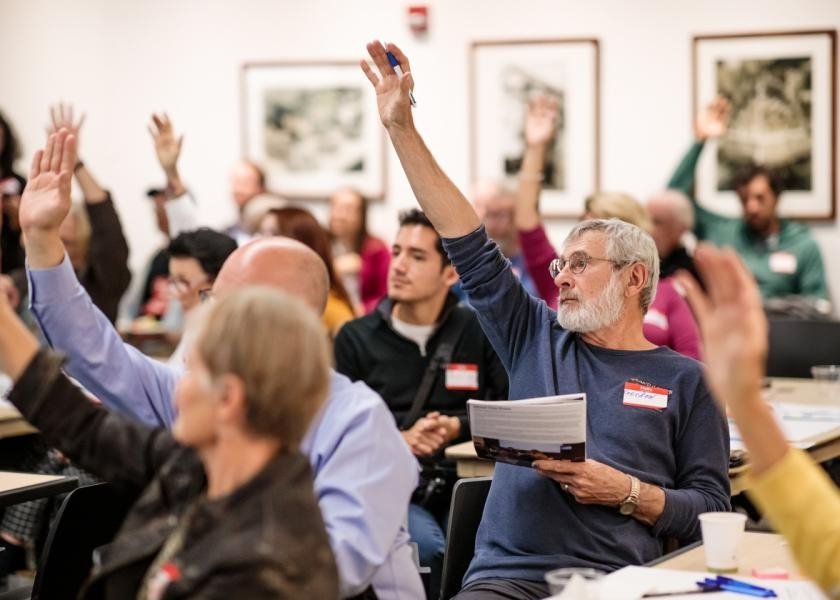
Consolidation has decimated local media in Colorado. Here community members in Boulder County discuss the future of local news.
Alyson McClaran
MEDIA 2070: MAKING THE CASE FOR MEDIA REPARATIONS
This past year, Free Press staff undertook a deep historical exploration of the ways in which the media have harmed Black people since the colonial era. Central to this effort is the creation of a major essay that we’re releasing in early fall.
The essay will be the centerpiece of our new Media 2070 project. We’re advocating for reparations for historical and present-day harms by media and tech companies — and will convene an alliance of Black organizations, thought leaders, media-makers and artists who will drive future media-reparations dialogue, visioning, institutional transformation and more.

LOOKING AHEAD
In the coming months we’ll forge ahead with our core work, respond to breaking crises, create new spaces for change, and share our platform with candidates while planning for a variety of election outcomes.
No matter what November throws at us, we’ll be ready. We invite and depend on you to dream, speak out and take action alongside us every step of the way.
FUND THE FIGHT
Your generosity makes our work possible: Please give what you can today. We’ll invest every dollar you donate in our most important asset: people power. We have a fearless and creative team backed by more than a million enthusiastic activists like you — and we never stand down from a fight.

You can support us by making a single or monthly donation online or by mailing a check to P.O. Box 60238, Florence, MA 01062. You can also make a contribution through a donor-advised fund, a gift of stocks or securities, or a planned gift. For more information, please visit other ways to give or contact us at info@freepress.net.
Thank you!
Free Press and Free Press Action are nonpartisan organizations fighting for your rights to connect and communicate. Free Press and Free Press Action do not support or oppose any candidate for public office.